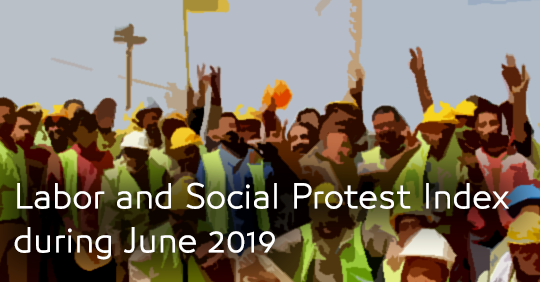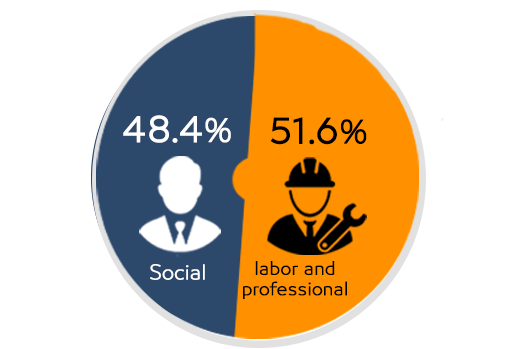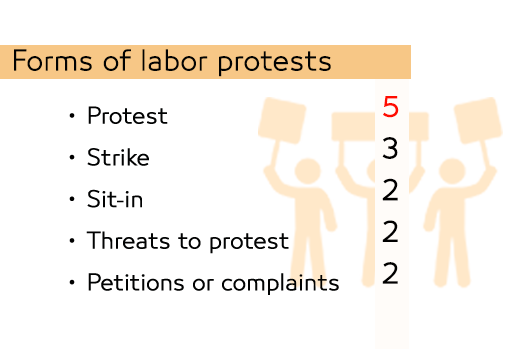
The Arabic Network for Human Rights Information (ANHRI)
The Freedom of Expression for Labor and Social Movements Program
Introduction
 For the first time this month, labor and professional protests were more than the social protests during June, as workers and professionals also expanded to resort to hunger strikes. This month there were 3 cases of hunger strikes.
For the first time this month, labor and professional protests were more than the social protests during June, as workers and professionals also expanded to resort to hunger strikes. This month there were 3 cases of hunger strikes.
Also, South Sinai, for the first time, was mentioned in the list of locations that witnessed labor protests.
On the other hand, suicide due to poor economic conditions remained the first choice of social movements to express protest.
The program of freedom of expression for labor and social movements monitored 31 protests during June, including 16 labor and professional protests, and 15 social protests, summarized as follows:
First: Labor and Professional Protests:
 The program monitored 16 labor and professional protests as follows;
The program monitored 16 labor and professional protests as follows;
- Vigils: 5
- Hunger strikes: 3
- Strike to work: 2
- Threatening to protest: 2
- Petition or complaint: 2
- Resorting to Labor Bureau: 1
- Protest: 1 case of suicide
This is detailed as follows;
- Vigils:
Workers and employees used vigils as a means of protest 5 times during June, as follows:
- Dozens of workers at Ermas Company, organized a protest on June 1st, to claim the disbursement of a grant to be disbursed each year. Security forces arrested 7 of the company’s employees on charges of inciting their colleagues to demonstrate.
- Dozens of lawyers, in the presence of a number union members, in Ismailia, Giza, October 6th, Menoufia, New Cairo, Mahalla, and Tanta, organized a protest on June 11th, on the ladder of the General Bar Association, in protest against amendments to the practicing law’s law.
- School feeding workers organized a protest on June 11th, in front of the Ministry of Agriculture in Dokki to demand the application of the minimum wage and fixation on permanent degrees.
- A number of temporary teachers organized a peaceful protest, in front of the Ministry of Education on June 23rd, to demand the renewal of their contracts, which ended in May without entering new competitions.
- Dozens of workers at a tourist housing village in Nabq area organized a protest on June 26th, for not being paid their salaries for several months. They had a record in the police station and presented a complaint to Sharm el-Sheikh Labor Bureau calling on officials to intervene.
- Hunger strikes:
The program monitored 3 cases of labor hunger strikes during June as follows:
- A policewoman – who works at a subsidiary of the security services at Luxor International Airport – entered an open hunger strike on June 9th, in Luxor General Hospital, because some of her colleagues at work had not been taking into account her psychological state after her mother’s death.
- Said Abdel Rahim Rais Hedeya – Head of Statistics Department at Deir Mawas Educational Administration in Menia – announced entering a hunger strike on June 18th, in Deir Mawas Central Hospital, in protest against his transfer from the Department of Statistics in Deir Mawas.
- Ahmed Gabber Abdel Qader – Head of the railway station in Edfu, Aswan – entered a hunger strike on June 18th, in protest against a penalty that had been against him at work, which caused the deterioration of his health condition so he was taken to Edfu General Hospital.
- Strike to work:
The program monitored 2 cases where workers and professionals resorted to striking to work as a peaceful method of protesting, as follows:
- The workers at the cleaning company responsible for cleaning in Hadaeq Al Qubbah district in Cairo, entered a strike to work in early June, after the company had been abstaining from paying their salaries for more than a month, causing a crisis of cleanliness in the neighborhood streets.
- The workers of Misr-Spain for the manufacture of blankets and textiles in Shubra Al-Khaymah entered a full-scale strike to work on June 22nd, after the failure of the Ministry of Manpower and the Governor of Qalubia to settle the disputes between them and the owner of the company.
- Threatening to protest:
The program monitored 2 cases in which workers threatened to protest as a means of labor protests during June:
- A number of employees of party newspapers, threatened to organize a protest on the stairs of the Journalists Syndicate on June 11th, in protest against the delay in finding a solution to the crisis of their newspapers, and the delayed issuance of licenses for “Al Khabbar” website.
- A number of temporary contract teachers on June 30, threatened to organize a protest, on July 1st, in front of the Cabinet of the Council of Ministers; to demand the renewal of their contracts with the Ministry of Education, which ended on May 31st..
- Petition or complaint:
The program monitored 2 cases where:
- The workers at “my health” of the Ministry of Health filed a collective complaint to the Presidency and the Cabinet, on June 10th, seeking all decision makers to deal with the decision of the “Minister of Health” to shut off the channel from the beginning of July 2019.
- Doctors of the Egyptian Authority for compulsory training, started a campaign on social media on June 15th, and also filed a collective complaint to the competent entities so that they can complete the procedures of starting work, so that they could join their colleagues who in their training program.
- Resorting to Labor Bureau:
Only case was monitored where:
- Workers of the Egypt-Spain factory for blankets and textiles decided to resort to the Labor Office on June 15th in an escalation of their crisis with the factory owner after they were surprised by the decision to stop their salaries as punishment for their previous strike.
- Protest:
Only one case was monitored where:
- Workers in textile company 2 in Damietta, announced sit-ins and strikes on June 17th due to late payment of their financial dues, and they chanted slogans against the current administration.
Second: Social Protests:
 The program monitored 15 social protests distributed as follows:
The program monitored 15 social protests distributed as follows:
- Suicide/attempted suicide: 5 cases
- Threatening to protest: 4 cases.
- Gatherings: 2 cases
- Sit-In, petition/complaint, road blocking, and vigils: 1 case each
And they detailed as follows:
- Suicide/attempted suicide:
5 cases of suicides or attempted suicides were monitored by the program for poor life conditions, as follows:
- “Ahmad M. F.“ 46, a waiter at a famous fish restaurant in Alexandria, committed suicide because of financial distress, and not being able to buy Eid clothes and items.
- “Essam M. A.” 52 years old, farmer, and a resident of the Department of Wadi Al-Natroun in Beheira, committed suicide by eating a poisonous tablet used in the preservation of grain, on June 1st because of passing through financial distress.
- “M. A.” 47, a Managing Director of a company, on June 12th, committed suicide by throwing himself from the 9th floor of his residence in Nasr City district because of financial difficulties.
- A young man in the third decade of age, committed suicide by hanging from the roof of his house in Hadaeq Al Qubbah on June 15th. Investigations revealed that he was employed in tourism and suffered a psychological condition because he was unable to get married for financial reasons.
- “N. E. A.” 50 years, a motorcycle driver committed suicide by electrifying himself in Toukh in Qalubia on June 25th after disputes between him and his wife because of the expenses of the house.
- Threatening to protest:
4 cases were monitored as follows:
- On June 10th, the Union of Representatives and Activists threatened the owners of the old properties threatened to organize a vigil on June 14th in Fustat Park in Ein El-Seara in order to demand the liberation of all types of old rents.
- MP Ahmed Baali Member of the House of Representatives for Nation’s Future Party in Ismailia threatened to have sit in the parliament during the plenary session on June 10th because the delay of Al-Qassas Hospital operation and the completion of the development of the hospital of Tel Al-Kabir fevers.
- Residents of phase 1 of Dar Misr Housing Project in Shorouk city on June 12th threatened to organize a protest on the morning of June 15th on the occasion of the 3 years passing of not completing the project facilities.
- Dozens of owners of units at phase1 Dar Misr Housing Project in Shorouk city on June 15th threatened to organize a protest to denounce the neglect of the project, and the delay of completion of the phase 1, despite the passage of 3 years on the dates of delivery.
- Gatherings:
2 cases were monitored as follows:
- Dozens of people residents of Nagaa Al Arab in Mina al – Basal west of Alexandria, on June 9th gathered in front of the house of the girl “Sundus” who was killed by 3 brothers from her neighbors to steal her small earring, and they demanded the execution of the 3 brothers.
- Secondary First Grade Students in Qenaiat Secondary School in Sharqia, on June 27th, protested against their results. The Director of the Educational Department addressed them to make complaints to the Ministry.
- Sit-In:
1 case of sit-ins was witnessed during June 2019 for social reasons, where:
- Members of the “Shahbandar” list at the Chamber of Commerce in Sohag held a sit-in on June 14th, in objection to the grants granted by the members of the General Assembly to the “Continuous Giving” list. The security services intervened
- petition/complaint:
1 case was monitored as follows:
- MP Fathi Qandil, started a sharp attack on officials of the water company in Qena, on June 9th stressing that throughout the whole month of Ramadan there was no water in Awlad Negm village.
- road blocking:
1 case was monitored as follows:
- A citizen named “Rozza” blocked the Gharbia Road on June 1st, following his departure from the Said al-Badawi Mosque and the completion of the celebration of Laylat al-Qadr, demanding the lighting of the bridge of Stouta Square.
- vigils:
1 case was monitored as follows:
- Members of the Al Moqaweloun Al Arab SC, on June 13th held a protest against the board of the club, due to poor services, demanding the need to pay attention to playgrounds and swimming pools, as well as the care of services, the establishment of new swimming pools and a mosque within the club.
Third: Geographical distribution of labor and professional protests:

Cairo topped the labor and professional protests for the month of June with 8 protests,
While Qalubia came second with 2 protests,
And (Aswan, Luxor, Giza, Menia, South Sinai, and Damietta) came third with 1 each.
Fourth: Geographical distribution of social protests:

Cairo topped the social protests in June with 7 protests,
Alexandria came second with 2 protests,
The governorates of Beheira, Sharqia, Gharbia, Qalubia, Sohag and Qena came third place with 1 each.
Fifth: Sectoral distribution of labor and professional protests:

The sectors of education & scientific research and textile & weaving, occupied the forefront of labor protests for the month of June with 3 protests,
While the sectors of health, transport and communications came second by 2 protests for each the sectors of security, media, journalism, printing, publishing, agriculture, irrigation, fishing, lawyers, tourism, localities and services ranked third with 1 protest each.
Sixth: Sectoral Distribution of Social protests during June 2019:

The “other” sector, which includes suicides due to poor living conditions came at the top of the social sectors protesting in June by 5 cases,
The housing sector came second with 3 protests,
While the sectors of security, trade, education and scientific research, sports, health, localities and services, water, sanitation and electricity ranked third with 1 each.
The Arabic Network for Human Rights Information (ANHRI)
The Freedom of Expression for Labor and Social Movements Program
Labor and Social Protest Index during June 2019 pdf







